高二英语必修五unit5知识点归纳
- 格式:pdf
- 大小:11.13 KB
- 文档页数:7
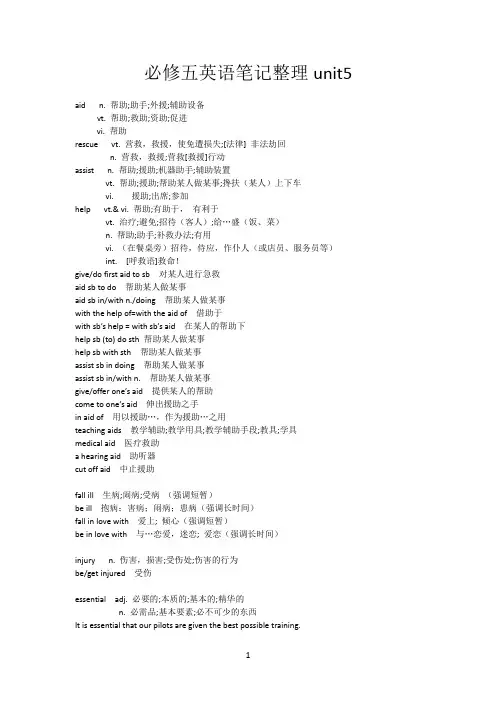
必修五英语笔记整理unit5aid n. 帮助;助手;外援;辅助设备vt. 帮助;救助;资助;促进vi. 帮助rescue vt. 营救,救援,使免遭损失;[法律] 非法劫回n. 营救,救援;营救[救援]行动assist n. 帮助;援助;机器助手;辅助装置vt. 帮助;援助;帮助某人做某事;搀扶(某人)上下车vi. 援助;出席;参加help vt.& vi. 帮助;有助于,有利于vt. 治疗;避免;招待(客人);给…盛(饭、菜)n. 帮助;助手;补救办法;有用vi. (在餐桌旁)招待,侍应,作仆人(或店员、服务员等)int. [呼救语]救命!give/do first aid to sb 对某人进行急救aid sb to do 帮助某人做某事aid sb in/with n./doing 帮助某人做某事with the help of=with the aid of 借助于with sb’s help = with sb’s aid 在某人的帮助下help sb (to) do sth 帮助某人做某事help sb with sth 帮助某人做某事assist sb in doing 帮助某人做某事assist sb in/with n. 帮助某人做某事give/offer one’s aid 提供某人的帮助come to one’s aid 伸出援助之手in aid of 用以援助…,作为援助…之用teaching aids 教学辅助;教学用具;教学辅助手段;教具;学具medical aid 医疗救助a hearing aid 助听器cut off aid 中止援助fall ill 生病;闹病;受病(强调短暂)be ill 抱病;害病;闹病;患病(强调长时间)fall in love with 爱上; 倾心(强调短暂)be in love with 与…恋爱,迷恋; 爱恋(强调长时间)injury n. 伤害,损害;受伤处;伤害的行为be/get injured 受伤essential adj. 必要的;本质的;基本的;精华的n. 必需品;基本要素;必不可少的东西It is essential that our pilots are given the best possible training.我们的飞行员必须接受最好的训练。
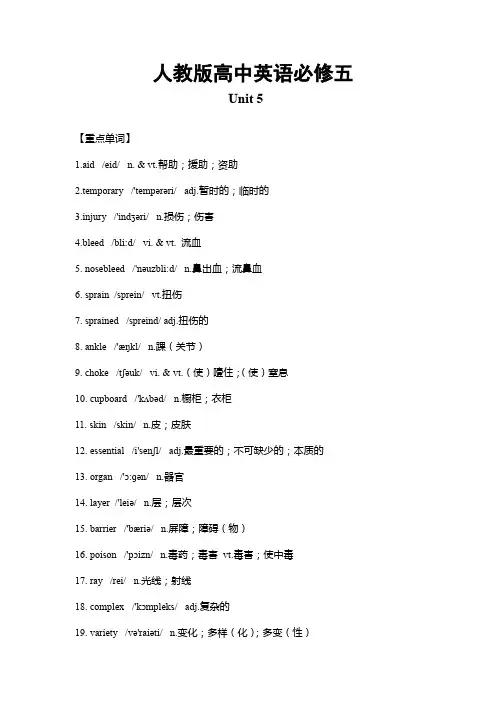
人教版高中英语必修五Unit 5【重点单词】1.aid /eid/ n.& vt.帮助;援助;资助2.temporary /'tempərəri/ adj.暂时的;临时的3.injury /'indʒəri/ n.损伤;伤害4.bleed /bli:d/ vi.& vt. 流血5. nosebleed /'nəuzbli:d/ n.鼻出血;流鼻血6. sprain/sprein/ vt.扭伤7. sprained /spreind/adj.扭伤的8. ankle /'æŋkl/ n.踝(关节)9. choke /tʃəuk/ vi.& vt.(使)噎住;(使)窒息10. cupboard /'kʌbəd/ n.橱柜;衣柜11. skin /skin/ n.皮;皮肤12. essential /i'senʃl/ adj.最重要的;不可缺少的;本质的13. organ /'ɔ:ɡən/ n.器官14. layer/'leiə/ n.层;层次15. barrier /'bæriə/ n.屏障;障碍(物)16. poison /'pɔizn/ n.毒药;毒害vt.毒害;使中毒17. ray /rei/ n.光线;射线18. complex /'kɔmpleks/ adj.复杂的19. variety /və'raiəti/ n.变化;多样(化);多变(性)20. liquid /'likwid/n.液体21. radiation /reidi'eiʃn/ n.辐射;射线22. mild /maild/ adj.轻微的;温和的;温柔的23. mildly /'maildli/ adv.轻微地;温和地24. pan /pæn/ n.平底锅;盘子25. stove /stəuv/ n.炉子;火炉26. heal /hi:l/ vi.& vt.(使)康复;(使)化解27. tissue /'tiʃu:/ n.(生物)组织;薄的织物;手巾纸28. swell /swel/ vi.& vt.(使)膨胀;隆起29. swollen /'swəulən/ adj.肿胀的30. blister /'blistə/ n.水泡vi.& vt.(使)起泡31. watery /'wɔ:təri/ adj.(似)水的32. char /tʃɑ:/ vi.烧焦33. nerve /nə:v/ n.神经;胆量34. scissors /'sizəz/n.(pl.)剪刀35. unbearable /ʌn'beərəbl/ adj.难以忍受的;不能容忍的36. basin /'beisn/n.盆;盆地37. squeeze /skwi:z/ vt.& vi.榨;挤;压榨38. bandage /'bændidʒ/n.绷带39. infection /in'fekʃn/ n.传染;传染病;感染40. vital /'vaitl/ adj.至关重要的;生死攸关的41. symptom /'simptəm/ n.症状;征兆42. label /'leibl/ vt.加标签或标记;分类n.标签;标记43. kettle /'ketl/ n.(水)壶;罐44. pour/pɔ:(r)/ vt.& vi.倒;灌;注;涌45. wrist /rist/ n.手腕46. damp /dæmp/ adj.潮湿的47. sleeve/sli:v/ n.袖子48. blouse /blauz/ n.女衬衫49. tight /tait/ adj.牢的;紧的;紧密的50. tightly /taitli/adv.紧地;牢牢地51. firm/'fə:m/ adj.(动作)稳定有力的;坚定的52. firmly /'fə:mli/adv.坚固地;稳定地53. throat /θrəut/ n.咽喉;喉咙54. ceremony /'seriməni/ n.典礼;仪式;礼节55. bravery /'breivəri/ n.勇敢;勇气56. stab /stæb/ vt.& vi.刺;戳;刺伤57. treat /tri:t/ vt.& vi.治疗;对待;款待n.款待;招待58. apply /ə'plai/ vt.涂;敷;搽;应用;运用vi.申请;请求;使用;有效59. pressure/'preʃə/ n.压力;挤压;压迫(感)60. ambulance/'æmbjuləns/ n.救护车61. scheme /ski:m/ n.方案;计划62. bruise /bru:z/ n.& vi.瘀伤;擦伤【重点短语】1.give / offer / do first aid to sb. 对某人急救2.perform / carry out first aid on sb. 对某人实施急救3.get injured/infected/burned 受伤/感染/烧伤4.save one’s life 挽救某人的生命5.electric shock 触电;电休克6.take off 脱下;(飞机)起飞7.squeeze out 榨出;挤出8.over and over again 反复;多次9.in place 在适当的位置;适当10.put one’s hands on 找到11.present sth. to sb. 赠予/ 给予某人某物12.a piece of jewellery 一件珠宝13.cause / do damage to…. 危害……14.stick sth. to… 把某物贴在……上15.make a difference 有影响【重点句型】1. Burns are called first degree, second degree or third degree burns depending on which layers of the skins are burnt.根据皮肤烧伤的层次分为一度烧伤、二度烧伤和三度烧伤。
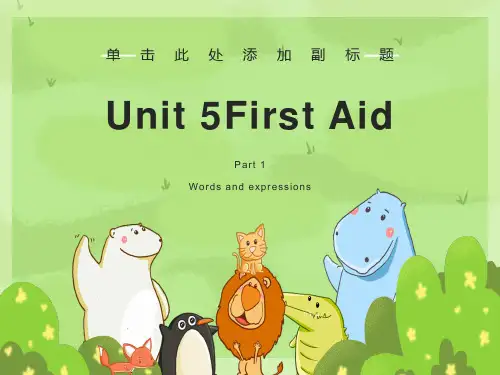
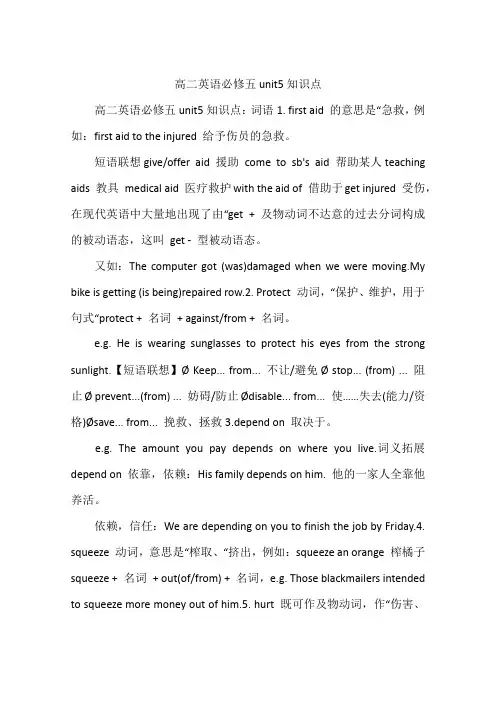
高二英语必修五unit5知识点高二英语必修五unit5知识点:词语1. first aid 的意思是“急救,例如:first aid to the injured 给予伤员的急救。
短语联想give/offer aid 援助come to sb's aid 帮助某人teaching aids 教具medical aid 医疗救护with the aid of 借助于get injured 受伤,在现代英语中大量地出现了由“get + 及物动词不达意的过去分词构成的被动语态,这叫get -型被动语态。
又如:The computer got (was)damaged when we were moving.My bike is getting (is being)repaired row.2. Protect 动词,“保护、维护,用于句式“protect + 名词+ against/from + 名词。
e.g. He is wearing sunglasses to protect his eyes from the strong sunlight.【短语联想】Ø Keep... from... 不让/避免Ø stop... (from) ... 阻止Ø prevent...(from) ... 妨碍/防止Ødisable... from... 使……失去(能力/资格)Øsave... from... 挽救、拯救3.depend on 取决于。
e.g. The amount you pay depends on where you live.词义拓展depend on 依靠,依赖:His family depends on him. 他的一家人全靠他养活。
依赖,信任:We are depending on you to finish the job by Friday.4. squeeze 动词,意思是“榨取、“挤出,例如:squeeze an orange 榨橘子squeeze + 名词+ out(of/from) + 名词,e.g. Those blackmailers intended to squeeze more money out of him.5. hurt 既可作及物动词,作“伤害、“使受伤解,也可作不及物动词,作“疼痛、“感到疼痛解。
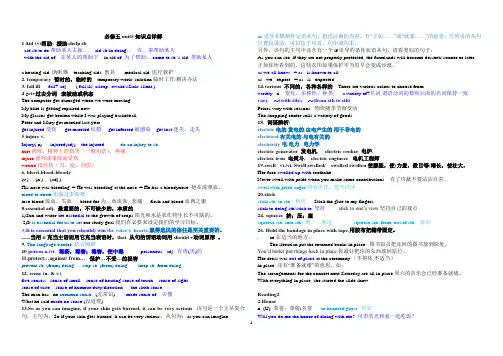
必修五unit5知识点详解1 Aid (v)帮助; 援助=help sbaid sb to do帮助某人去做….aid sb in doing…在…事帮助某人with the aid of 在某人的帮助下in aid of 为了帮助… come to sb.'s aid 帮助某人a hearing aid 助听器teaching aids 教具 medical aid 医疗救护2. temporary 暂时的,临时的temporary work/ solution临时工作/解决办法3. fall ill fall+ adj. ( fall ill/ asleep/ awake/sSick/ silent )4 get+过去分词表被动或状态The computer got damaged when we were moving.My bike is getting repaired now.My glasses got broken while I was playing basketball.Peter and Mary got married last year.get injured受伤get married结婚 get infected被感染get lost迷失,走失5 injure v.Injury( n) injured(adj) the injured do an injury to sbhurt肉体,精神上的伤害(一般用语),疼痛injure意外或事故而受伤wound指外伤(刀、枪、剑伤)6. bleed-blood-bloody(v.) (n.) (adj.)His nose was bleeding. = He was bleeding at the nose .= He has a bloodynose. 他在流鼻血。
bleed to death出血过多而死lose blood流血、失血bleed for为…而流血, 悲痛flesh and blood血肉之躯8.essential adj. 最重要的,不可缺少的,本质的1)Sun and water are essential to the growth of crops.阳光和水是农作物生长不可缺的。
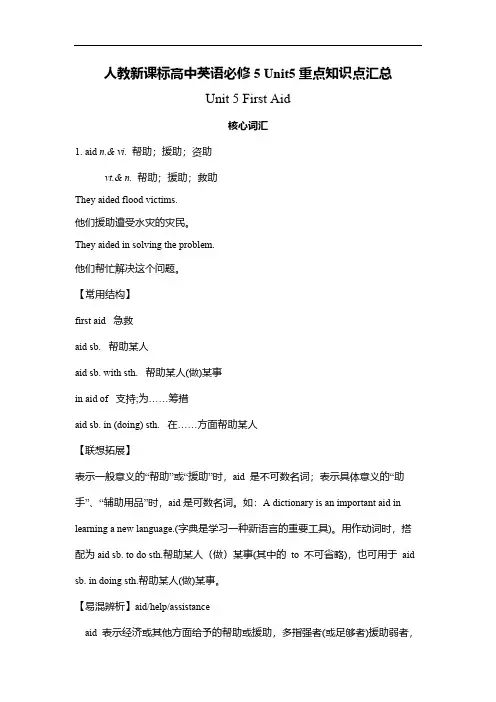
人教新课标高中英语必修5 Unit5重点知识点汇总Unit 5 First Aid核心词汇1. aid n.& vi.帮助;援助;资助vt.& n.帮助;援助;救助They aided flood victims.他们援助遭受水灾的灾民。
They aided in solving the problem.他们帮忙解决这个问题。
【常用结构】first aid 急救aid sb. 帮助某人aid sb. with sth. 帮助某人(做)某事in aid of 支持;为……筹措aid sb. in (doing) sth. 在……方面帮助某人【联想拓展】表示一般意义的“帮助”或“援助”时,aid 是不可数名词;表示具体意义的“助手”、“辅助用品”时,aid是可数名词。
如:A dictionary is an important aid in learning a new language.(字典是学习一种新语言的重要工具)。
用作动词时,搭配为aid sb. to do sth.帮助某人(做)某事(其中的to 不可省略),也可用于aid sb. in doing sth.帮助某人(做)某事。
【易混辨析】aid/help/assistanceaid 表示经济或其他方面给予的帮助或援助,多指强者(或足够者)援助弱者,多用于团体。
help 指给人精神或物质上的帮助,强调受助者的需要,有利于达到一定的目的或目标。
assistance 多指个人给予道义、知识、物质等方面的帮助,所提供的帮助往往只起辅助作用。
2. injury n.损伤;伤害Many common injuries happen every day in the home.家庭中每天都有许多常见的意外伤害。
【常用结构】do sb. an injury 伤害某人be an injury to sb./sth. 伤害;危害某人/某事escape injury 免受伤害repair injury 赔偿损害serious/severe injuries 重伤a slight injury 轻伤In the crash he suffered severe injuries to the head and arms.在事故中他头部和双臂受了重伤。
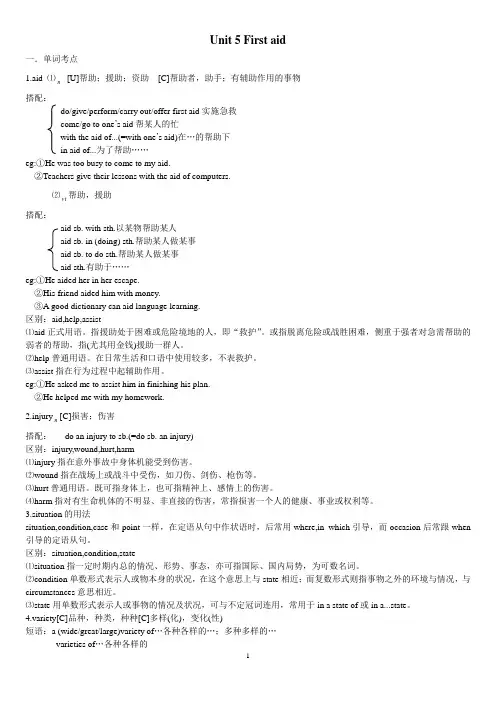
Unit 5 First aid一.单词考点[U]帮助;援助;资助[C]帮助者,助手;有辅助作用的事物1.aid ⑴n搭配:do/give/perform/carry out/offer first aid实施急救come/go to one’s aid帮某人的忙with the aid of...(=with one’s aid)在…的帮助下in aid of...为了帮助……eg:①He was too busy to come to my aid.②Teachers give their lessons with the aid of computers.⑵帮助,援助vt搭配:aid sb. with sth.以某物帮助某人aid sb. in (doing) sth.帮助某人做某事aid sb. to do sth.帮助某人做某事aid sth.有助于……eg:①He aided her in her escape.②His friend aided him with money.③A good dictionary can aid language learning.区别:aid,help,assist⑴aid正式用语。
指援助处于困难或危险境地的人,即“救护”。
或指脱离危险或战胜困难,侧重于强者对急需帮助的弱者的帮助,指(尤其用金钱)援助一群人。
⑵help普通用语。
在日常生活和口语中使用较多,不表救护。
⑶assist指在行为过程中起辅助作用。
eg:①He asked me to assist him in finishing his plan.②He helped me with my homework.[C]损害;伤害2.injuryn搭配:do an injury to sb.(=do sb. an injury)区别:injury,wound,hurt,harm⑴injury指在意外事故中身体机能受到伤害。
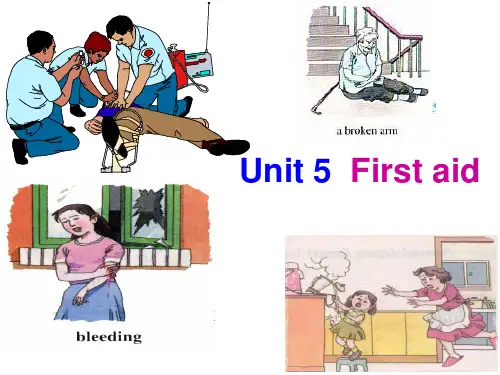
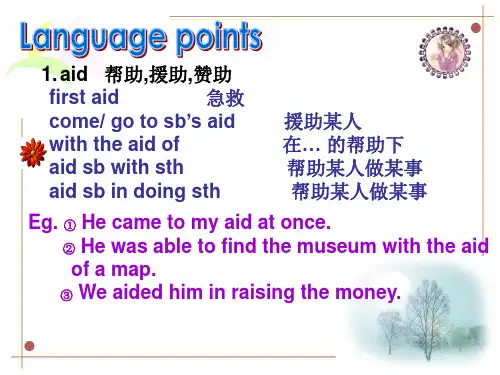

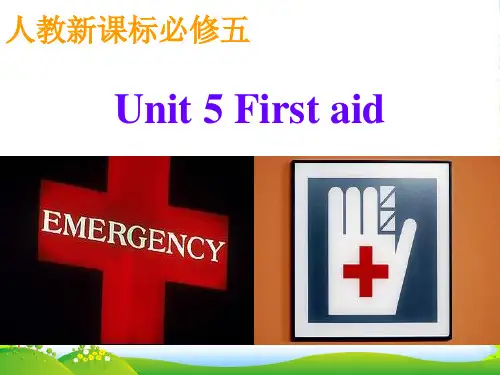
Unit 5 First aidReadingFIRST AID FOR BURNS烧伤的急救The skin is an essential part of your body and its largest organ.You have three layers of skin which act as a barrier against disease, poisons and the sun's harmful rays.【which定从】The functions of your skin are also very complex:it keeps you warm or cool;it prevents your body from losing too much water;it is where you feel cold, heat or pain and it gives you your sense of touch.【表从】So as you can imagine, if your skin gets burned it can be very serious.【as方式状从/定从;if条件状从】First aid is a very important first step in the treatment of bums.皮肤是身体必不可少的部分,也是身体的最大器官。
皮肤有三层,它们是防病、防毒、抵御太阳有害光线侵害的一道屏障。
皮肤的功能十分复杂。
皮肤可以保暖或御寒,保持体内水分。
正是皮肤使你感到冷热、疼痛,它还使你有触觉。
因此,你可以想象到,如果你的皮肤烧伤了,就可能非常严重。
在治疗烧伤的过程中,紧急处理是非常重要的第一步。
Causes of burnsYou can get burned by a variety of things: hot liquids, steam, fire, radiation (by being close to high heat or fire, etc), the sun, electricity or chemicals.烧伤的原因:你可能由于各种原因而烧伤:灼热的液体、水蒸气、火、辐射(由于靠近高温或大火)、阳光、电和化学物品。
必修五unit 5 知识点Warming- up :1.aid n. 帮助;援助;资助常用搭配:with the aid of sb 在某人的帮助下in aid of 为了帮助……be a great aid to\for 对……有极大帮助do\give\offer \perform\carry out first aid j进行急救a hearing aid 助听器c ome to one’s aid 帮助某人Eg. He was too busy to come to my aid.I know how to perform first aid at school.I’m collecting money in aid of starving children. 为了帮助饥饿的孩子们,我正在募捐。
With the aid of a local artist, the pupils created the wall painting. 学生们在当地一名艺术家的帮助下,创作了这幅壁画。
v. 帮助,援助常用搭配:aid sb to do sth= aid sb in doing sth 帮助某人做某事aid sb with sth 以某物帮助某人eg. They were accused of aiding him in his escape. 他们被控告帮助他逃跑。
They aided the low-income families with money. 他们用钱帮助那些低收入家庭2.temporary adj. 短暂的;暂时的;临时的eg. He found a temporary accommodation in Paris. 他在巴黎找到了一个临时住所This kind of medicine can only give you temporary relief from pain.这种药只能给你短暂地缓解疼痛。
高中英语必修5〔外研版〕Unit 5 The Great Sports Personality知识点总结一、重点辞汇·根本用法athletics n. 竞技;体育运动;田径运动She showed us the athletics awards she had won.她给咱们看她博得的体育运动奖。
I like the athletics events and the team sports.我喜欢田径工程和集体工程。
·知识拓展--相关单词1. athletic adj. 运动的,运发动的;体魄强健的The boy got in to the athletic school after a special test.男孩通过一次专门考试后进了体育学校。
John is an athletic boy. He is good at running.约翰体魄强健。
他擅长跑步。
2. athlete n. 运发动,体育家;身强力壮的人The athlete is able to jump two meters.这位运发动能跳两米高。
·根本用法1. ring n. 拳击场;戒指;铃声;环形物拳击手将对手击出了拳击台。
He can't get his ring off his finger.他无法指导戒指从手指上拿下来。
2. ring v. 按铃;回响;打I'll ring you up some time during the week.本周的某个时候我给你打。
·根本用法1. track n. 轨道;足迹;小道I like to watch field and track events.我喜欢观看田径比赛。
What you just said is completely off the track.你方才讲的话完全离题了。
He runs around the track every morning.他天天早晨绕着跑道跑步。
高二英语必修五unit5知识点归纳【词语】1. first aid 的意思是“急救”,例如:first aid to theinjured 给予伤员的急救。
短语联想give/offer aid 援助 come to sb's aid 协助某人teaching aids 教具 medical aid 医疗救护with the aid of 借助于get injured 受伤,在现代英语中大量地出现了由“get + 及物动词不达意的过去分词”构成的被动语态,这叫 get - 型被动语态。
又如:The computer got (was)damaged when we were moving.My bike is getting (is being)repaired row.2. Protect 动词,“保护、维护”,用于句式“protect + 名词 + against/from + 名词”。
e.g. He is wearing sunglasses to protect his eyes fromthe strong sunlight.【短语联想】Keep... from... 不让/避免stop... (from) ... 阻止prevent...(from) ... 妨碍/防止disable... from... 使……失去(水平/资格)save... from... 挽救、拯救3.depend on 取决于。
e.g. The amount you pay depends on where you live.词义拓展depend on 依靠,依赖:His family depends on him. 他的一家人全靠他养活。
依赖,信任:We are depending on you to finish the job by Friday.4. squeeze 动词,意思是“榨取”、“挤出”,例如:squeeze an orange 榨橘子squeeze + 名词 + out(of/from) + 名词,e.g. Those blackmailers intended to squeeze more moneyout of him.5. hurt 既可作及物动词,作“伤害”、“使受伤”解,也可作不及物动词,作“疼痛”、“感到疼痛”解。
既可表达身体的受伤,也能够表达情感的伤害。
例如:e.g. The little boy has fallen off a ladder and hurthimself.The driver hurt himself in the accident. 司机在事故中受了伤。
6. unless 除非……;如果不……。
如:7. icy adj. 冰凉的-y 是个形容词后缀。
如:windy 有风的 hilly 多小山的 sleepy 困倦的greeny 略呈绿色 spicy 辛辣的 woody 树木茂密的thirsty 饥渴的 dirty 脏的 snowy 下雪的8. in place 放在适当的地方。
如:e.g. The librarian put the returned books in place. 图书管理员把还回的图书放到原处。
Yon'd better put things back in place.Otherwise, it willbe difficult to find things.9. sense n. 感觉sense of touch 触觉 sense of sight 视觉sense of hearing 听觉 sense of smell 嗅觉sense of humour 幽默感 sense of beauty 美感ense of hunger 饥饿感 the sixth sense 第六感10. variety n. 多样, 种类,★ a variety of…各种各样……【词语联想】various a. 不同的, 各种的, 多方面的, 很多的e.g. Everyone arrived late at the party for variousreasons.【重点句型】1. Remove clothing using scissors if necessary unless itis stuck to the burn.除非衣服粘贴在烧伤面上,否则都要把衣服脱掉。
如果需要的话,能够使用剪刀。
unless是连词,意为“如果不,除非”。
在真实条件句中,unless引导的肯定条件状语从句,能够和if...not...引导的否定状语从句互换。
Unless you change your mind,I won,t be able to help you.=If you don?t change your mind,I won ’t be able tohelp you.除非你改变想法,否则我不能协助你。
I want you to keep working unless I tell you to stop.=I want you to keep working if I don’t tell you to stop.如果我没说让你停,你就得继续干。
注意:unless 不可用于假想的事情,所以当if...not引导非真实条件状语从句时,一般不可改用unless。
例题:单项填空①All the dishes in this menu, ______ otherwise stated,will serve two to three people.A. AsB. ifC. thoughD. unless②Don’t promise anything ______ you are one hundredpercent sure.A. WhetherB. afterC. howD. unless解析:①选D。
考查状语从句的引导词。
句意为:在这份菜单上的所有菜,除非另外说明,会给两到三个人食用。
②选D。
句意为:除非你有完全的把握,否则不要做出承诺。
unless除非。
2. John was studying in his room when he heard screaming.约翰正在房里学习,突然听到一声尖叫。
此句型中when作并列连词,相当于and then,意为“正当……时,突然”。
常用结构:be doing...when... 正在做……突然……had done...when... 刚做了……突然……be about to do...when... 刚要做……突然……be on the point of doing sth. when... 刚要做……突然……例题:单项填空①She had just finished her homework _____ her motherasked her to practice playing the piano yesterday.A. WhenB. whileC. afterD. since②We were swimming in the lake ______ suddenly the storm started.A. WhenB. whileC. untilD. before③I ______ along the street looking for a place to parkwhen the accident .A. went; was occurringB. went; occurredC. was going; occurredD. was going; had occurred解析:①选A。
由句意可知此处when用作并列连词,意为“这时”。
②选A。
when作连词,表示“正在这时”。
句意为:我们正在湖中游泳,突然暴风雨来了。
③选C。
主句要用过去实行时,表示当时正在路上走着;when引导的从句多用一般过去时。
【重点短语】1. fall ill 生病Hearing the bad news, he fell ill. 听到坏消息后,他病了。
联想拓展fall behind 落后fall sick 生病fall asleep 入睡fall down 掉下;倒塌fall in love with ... 爱上……fall off 脱落;减少;从……上掉下fall into the habit of ... 养成……的习惯fall over 跌倒;翻倒;落到……上fall silent 沉默2. in place在适当的位置;适当I like everything to be in place.我喜欢所有的东西都放在原来的地方。
With everything in place, she started the slide show.一切就绪,她开始放幻灯片。
联想拓展be in/out of order 有条理/无条理;坏了be in/out of control 正常/失控be in/out of danger 有危险/脱离危险in place of...=take the place of... 代替;取代give place to 被……取代;让位于……out of place 不在适当的位置; 不合适3. make a difference有很大差别;有很大不同;有很大的关系/影响Whether he could get the support from his parents made a great difference to the plan.他是否能得到父母的支持对这个计划的影响很大。
Does it any difference whether he?ll attend the meeting?他出不出席会议有什么区别吗?联想拓展make a difference between ...and ... 区别对待……make some difference to对……有些关系make no difference to 对……没相关系make all the difference 关系重大;大不相同。